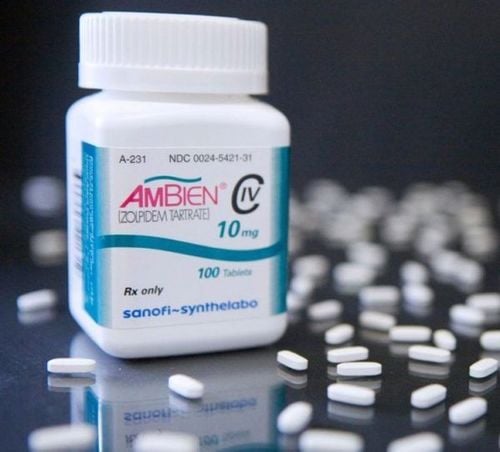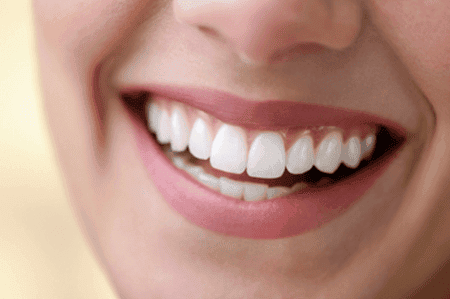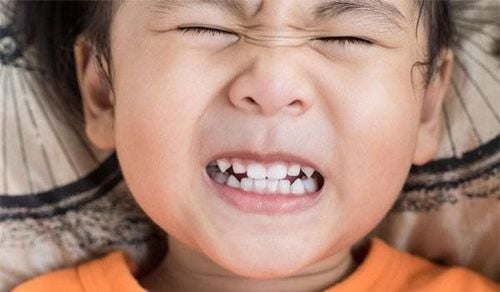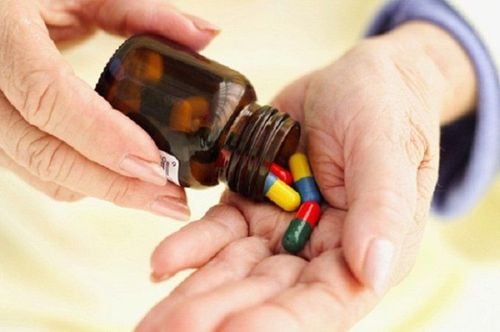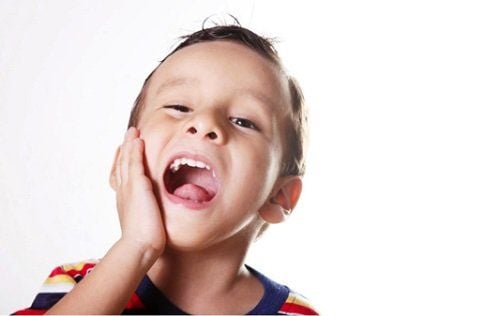This is an automatically translated article.
The article was professionally consulted by Specialist Doctor II Nguyen Khanh Nam - Doctor of Odonto-Stomatology - Department of General Surgery - Vinmec Nha Trang International General Hospital.Sleep grinding is a sleep movement disorder that is quite common in adults and children. Teeth grinding while sleeping is not only uncomfortable for the person sleeping next to it, but it is also a manifestation of a number of diseases, which can even lead to sleep apnea. So what causes teeth grinding while sleeping?
1. What is teeth grinding while sleeping?
Teeth grinding is an activity that can potentially overload the chewing system. Currently, the main cause of the disease is still unknown. However, the disease is often accompanied by stress, occlusal disorders, allergies and related to sleeping positions. Unfortunately, there is currently little data on the causes and effects of the disease. Therefore, careful assessment and treatment is the best way to make the right indications.Bruxism is defined as “repetitive activity of the jaw muscles, characterized by clenching or grinding of the teeth and/or by bracing and pushing of the lower jaw”. This activity may or may not make a creaking sound.
Teeth grinding does not perform the function of the chewing system and can cause occlusal injury. The bite affects the function of the muscles, thereby affecting the temporomandibular joint. Therefore, any change in the bite affects both muscles and joints. Misaligned bite is one of the most common causes of teeth grinding. Its consequences can cause pain in the temporomandibular joint.
Teeth grinding at sleep: Appears in both adults and children. Usually back and forth grinding.
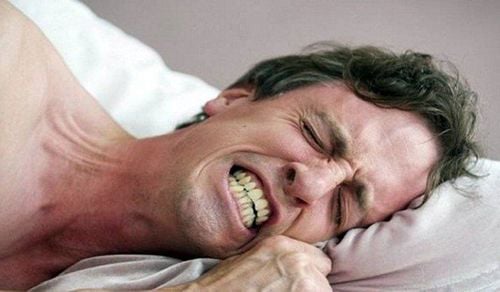
2. Causes of teeth grinding while sleeping
The cause of teeth grinding while sleeping is not really clear, but it is thought that teeth grinding is often related to the following factors:
2.1. Psychosocial factors
Stress Studies have reported that psychological factors have a significant influence on the disease, mainly a stressful lifestyle. Evidence in this regard is growing but inconclusive. Emotional stress is considered the main trigger. Nocturnal teeth grinding may be a response to ongoing or ongoing daytime stress. Stress can occur in people who work a lot, are oppressed; students are in exam season. When stress is accompanied by anxiety, repression can trigger brain activity. This increases nerve stimulation, which can trigger all of the reactions of teeth grinding.Personality: Strong, excitable people are more likely to get sick.
Age: Teeth grinding is common at a young age and usually disappears as we get older.
2.2 Genetic factors
People with family members who have or have had bruxism while sleeping are at risk of developing this condition as well. Research suggests that there may be some degree of genetic involvement in developing bruxism. 21-50% of people who grind their teeth at night have a family member who has had it before. This suggests that genetic factors are involved in the disease.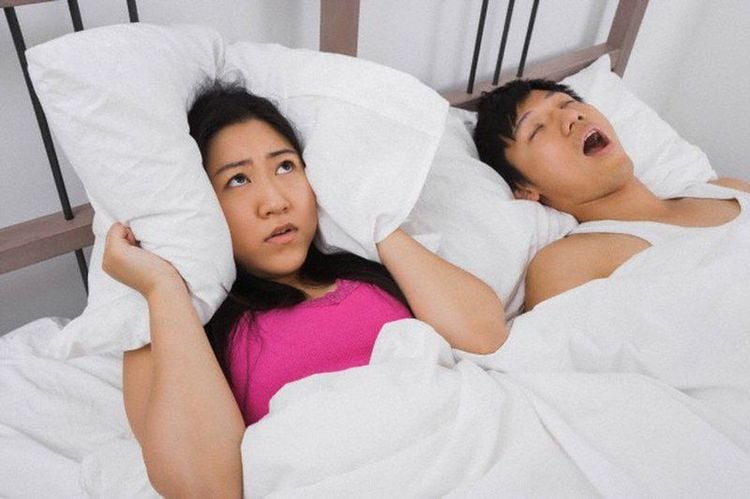
2.3 Drugs and Stimulants
Some side effects of drugs and narcotics that increase the risk of teeth grinding include: Dopamine agonists and antagonists. Tricyclic antidepressants. Selective serotonin reuptake inhibitors. Alcohol, cocaine..2.4 Local factors
Impaired occlusion can be a causative problem. They interfere with normal chewing movements. The cause can be in a single tooth or a group of teeth. Example: When the upper wisdom teeth are lost, the lower wisdom teeth erupt. When biting back, the lower jaw has to come forward more to close the jaw. This distorts normal jaw movement.
2.5 Whole body factor
Allergies: Due to intestinal parasites, digestive disorders or food allergies. These are the possible causes of severe bruxism in children (Marks, 1980).Nutritional, urinary, and endocrine disorders are also favorable factors for the disease, more common in children than in adults.
Vitamin deficiency, enzyme imbalance also affects the disease.
Central nervous system disorders that may be associated with the disease:
Cerebral palsy. Down's disease. Epileptic. Huntington's disease. Leigh disease. Meningococcal infection. Parkinson disease. Post-traumatic stress. Rett's syndrome.
2.6 Occupational factors
Certain occupations have special requirements that can cause teeth grinding or clenching. Example: The pianist grits his teeth while holding the piano while playing; porter workers gritted their teeth to exert themselves; Circus performers use their teeth to hold people in the air...2.7 Instinct factor
Some studies suggest that these habits are instinctive, behavioral activities of mammals. Its purpose is to maintain the sharpness of the teeth.3. Harm of teeth grinding while sleeping
Teeth grinding for the most part does not cause serious complications. But if the patient grinds his teeth with a heavy and frequent level, it can cause some harms such as: tooth damage, jaw bone damage, affecting dental restorations, teeth becoming sensitive due to wear even possible tooth fracture, temporomandibular joint disorder, headache, pain-headache, severe facial or jaw pain, facial deformity...
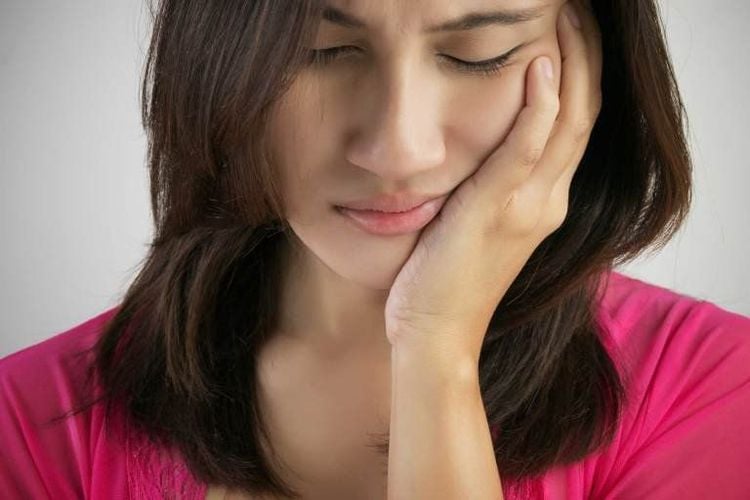
4. Overcome grinding teeth while sleeping
Teeth grinding is usually mild and does not require treatment, but treatment will be considered in severe and potentially harmful cases. Treatment of teeth grinding with the goal of reducing pain, reducing impact on teeth, restorations, temporomandibular joints and limiting continued grinding:
4.1 Stress management treatment
Teeth grinding due to stress should apply methods to help reduce stress such as changing the environment, regularly exercising, relaxing, treating sleep disorders, going to bed on time, massaging facial muscles, avoiding use stimulants, especially at night before bed.
Patients should try listening to music, taking a warm bath or doing gentle exercise to help relax and reduce the risk of teeth grinding while sleeping.
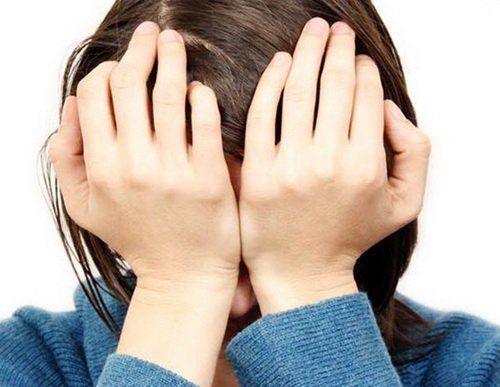
4.2 Changing habits of jaw movement and jaw adjustment
Correction of jaw movement habits often takes a long time and requires the support of dentists and psychologists.
4.3 Drug use
Drugs are not really effective in treating bruxism, but only in reducing excessive muscle tension caused by teeth grinding. Some of the medications used are muscle relaxants, pain relievers... Your doctor may prescribe some antidepressants or anti-anxiety medications for a short time to help control stress or emotional problems - the cause cause teeth grinding while sleeping. Botox injections, a toxin form of botulinum, help people with severe sleep bruxism that doesn't respond to other treatments

4.4 Dental interventions
Dental treatment helps protect teeth from the harmful effects of teeth grinding while sleeping, but it is not certain that it will completely treat bruxism. One of the common interventions is the use of anti-crunch trays to help protect the tooth surface from abrasion.
Some types of troughs also have the effect of adjusting jaw movement habits, which can help limit teeth grinding. This jaw guard can be made of soft material or hard acrylic, suitable for each person's upper and lower jaw.
Adjust the bite position to reduce excessive impact on the chewing muscles as well as the teeth. If the tooth wear is much, the teeth are sensitive, the patient needs to restore the tooth shape to restore the tooth relationship between the two jaws and the bite to match.
Teeth grinding, although not life-threatening, is persistent and can cause serious harm to your teeth. Treatment of teeth grinding requires patience and coordination of the patient.
Periodic health check-ups help to detect diseases early, so that there are treatment plans for optimal results. Currently, Vinmec International General Hospital has general health checkup packages suitable for each age, gender and individual needs of customers with a reasonable price policy, including:
Health checkup package diamond general health check-up package Vip special health check-up package Comprehensive general health check-up package Standard general health check-up package Patient's examination results will be returned to your home. After receiving the results of the general health examination, if you detect diseases that require intensive examination and treatment, you can use services from other specialties at the Hospital with quality treatment and services. outstanding customer service.
Please dial HOTLINE for more information or register for an appointment HERE. Download MyVinmec app to make appointments faster and to manage your bookings easily.





